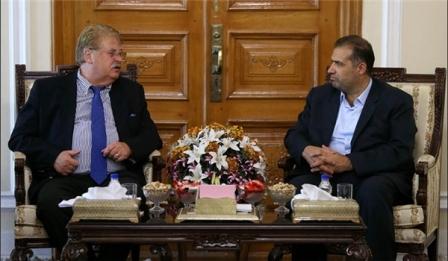 Chairman of the European Parliament Committee on Foreign Affairs Elmar Brok underlined that the new European Parliament is aware of the importance of ties with Iran.
Chairman of the European Parliament Committee on Foreign Affairs Elmar Brok underlined that the new European Parliament is aware of the importance of ties with Iran.
Brok made the remarks in a meeting with Head of the Iranian legislature’s Friendship Group with the European Parliament Kazzem Jalali in Tehran on Sunday.
During the meeting, Jalali pointed to the talks between Iran and the Group 5+1 (the five permanent UN Security Council members plus Germany), and said, "The nuclear talks were underway in desirable conditions, but unfortunately the (European Parliament’s Human Rights) resolution against Iran changed the overall atmosphere of the negotiations."
Jalali expressed surprise at the presence of a "shameless" group like the terrorist Mojahedin-e Khalq Organization (MKO, also known as MEK, PMOI and NCRI) in the European Parliament, and said, "Even the critics of Iran’s political system do not recognize the MKO and the European Parliament had better try to listen to the Iranian nation, statesmen and people’s true representatives."
Jalali reiterated that the talks between Iran and European Parliament can be a prelude to a bigger agreement in the future, "but harnessing the radicals, specially at the European Parliament, is the prerequisite for such an agreement".
Brok, for his part, said that the new European Parliament lays emphasis on the importance of the relations with Iran, and said, "The majority of the European Parliament do not like cooperation with groups such as MKO and only a minority group in the Parliament support the MKO."
Brok said that the EP welcomes achievement of a final deal by Iran and the G5+1, and added, "It will be in the interest of both sides in economic and political terms to resolve Iran’s nuclear issue and I believe that Iran is entitled to run civilian nuclear activities and I hope that the international community take this into consideration as well."
The EP adopted a resolution against the human rights conditions in Iran in April. The resolution came under harsh criticism by the Iranian Parliament Speaker, Ali Larijani, who described it as "distressed words".
"As a matter of fact, this resolution is nothing more than a political statement in terms of the method used for compiling the contents to show the European Parliament’s symbolic position which has no executive power… and a type of distressed wording is seen in this composition-like text," Larijani said, addressing the Iranian legislators in an open session of the parliament in April.
He said that the resolution welcomes expansion of ties with Iran, progress in talks between Tehran and the world powers and cooperation with Iran on Syria and fighting terrorism on one hand, and raises allegations against issues, including elections in Iran, human rights situation and women’s rights, which are considered as meddling in the country’s internal affairs, on the other hand.
Larijani questioned the wisdom of the European legislators who, he said, show willingness to increase extended cooperation with Iran in nuclear, regional and technological fields while uttering such "cheap and baseless words".
The resolution adopted by the European Parliament in a meeting in Brussels called for meetings between EU delegations and Iranian dissidents and opposition leaders and criticized the presidential elections in Iran.
The European’s move angered officials in Tehran as it was adopted after the western states voiced their consent and pleasure in the betterment of ties with Iran following a breakthrough deal over Tehran’s nuclear program.
